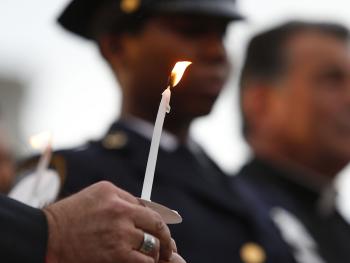
The Freedom from Religion Foundation (FFRF) has taken aim at the Ohio police chaplaincy program, calling it “unconstitutional.” The group, which states its purpose is “to promote the constitutional principle of separation of state and church, and to educate the public on matters relating to nontheism,” sent a letter to the police department in Mansfield, OH demanding, “The Mansfield police department needs to get rid of its chaplaincy program at once.”
The source of the group’s ire appeared to be due to the recent appointment of new police chaplain, Pastor Chad Hayes of Caesarea Baptist Church, as the second chaplain to the department. In an interview with the Mansfield News Journal, Hayes was quoted as saying, “As long as God is there and the story is saturated about Christ, as long as he gets more glory than me, that’s alright. I don’t seek attention.” The comments incensed the FFRF, which cited Hayes’s interview. “Government chaplains may only exist as an accommodation of a public employee’s religious beliefs when the government makes it difficult or impossible to seek out private ministries. In the case of police departments, there is no significant government burden on religious free exercise,” the letter went on to say.
The Mansfield Police Department has yet to respond. Karen Heineman, who wrote the letter on behalf of the FFRF, stated, “There is no reason to think a nonbelieving employee or crime victim would be comfortable dealing with a person who provides comfort from a religious viewpoint. Chaplains cannot simply set aside their religion in order to assist a nonbeliever, and are often unwilling to attempt to do so. Chaplains view the world and its problems through the lens of religion and a god, a view inapposite to nonbelievers.” She also cited several court cases to further highlight her claims that the program is unconstitutional.
It is unclear how far the FFRF is willing to take its case but with the recent Supreme Court ruling in favor of former football coach Joseph Kennedy, the establishment clause has been under increasing scrutiny. In that case, coach Joseph Kennedy had sued his former employer, the Bremerton School District in Washington, due to not allowing him to pray at the midfield line after games. In a 6-3 decision, the Supreme Court found that the school district had violated Kennedy’s First Amendment rights. The ruling received cheers from religious supporters and jeers from advocates like the FFRF who fear a theocratic government. Despite never appearing in the Constitution, the phrase “separation of Church and State” has become a staple of American ideology pitting two sides of the First Amendment against one another, with one side wanting to practice their faith in public freely and another side not wanting religion imposed on them. Such sides require a fine balance, as Supreme Court Justice Neil Gorsuch stated in the Court’s Kennedy decision, “Both the Free Exercise and Free Speech Clauses of the First Amendment protect expressions like Mr. Kennedy’s. Nor does a proper understanding of the Amendment’s Establishment Clause require the government to single out private religious speech for special disfavor. The Constitution and the best of our traditions counsel mutual respect and tolerance, not censorship and suppression, for religious and nonreligious views alike.”


